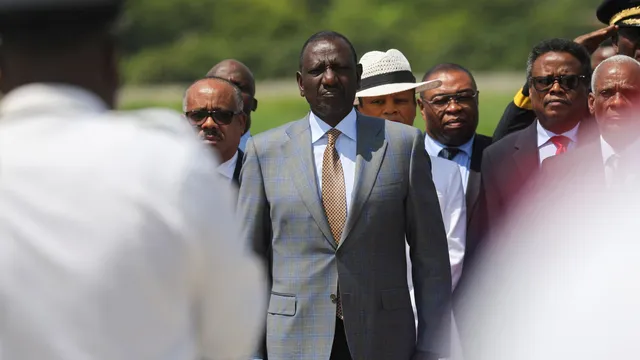
Kenya assesses police mission in Haiti amid rising violence
2024-09-21 00:00- Kenyan President William Ruto is in Haiti to assess a police mission aimed at combating gang violence.
- The UN-backed Multinational Security Support Mission has deployed less than a quarter of its planned force, with armed groups controlling about 80% of Port-au-Prince.
- Many Haitians are wary of international interventions, emphasizing that security alone cannot address the country's systemic problems.
Express your sentiment!
Insights
Kenyan President William Ruto arrived in Port-au-Prince, Haiti, to evaluate a Kenya-led police mission aimed at addressing escalating gang violence. This visit follows a warning from a UN expert about the worsening security situation in Haiti, where armed groups have gained significant control, particularly in the capital. The Kenyan police deployment, part of a UN-backed multinational mission, began three months ago but has struggled to make a substantial impact amid ongoing violence. Despite the presence of foreign police, armed groups reportedly control around 80% of Port-au-Prince, leading to a humanitarian crisis with over 578,000 Haitians displaced due to violence. The UN mission, known as the Multinational Security Support Mission (MSS), has deployed less than a quarter of its intended force, and its resources have been deemed inadequate by UN officials. The Haitian National Police also lack the necessary logistical and technical capabilities to effectively combat the gangs. The United States, a key supporter of the mission, is advocating for increased funding and personnel to strengthen the MSS. Secretary of State Antony Blinken plans to convene a meeting at the UN General Assembly to address Haiti's security, economic, and humanitarian needs, as well as to discuss the renewal of the mission's mandate. However, many Haitians remain skeptical of international interventions, recalling past negative experiences with UN forces. Civil society groups in Haiti emphasize the need for assistance to combat violence but caution that a security deployment alone will not resolve the country's deeper systemic issues. They call for safeguards to prevent potential abuses by the international police force, highlighting the importance of a comprehensive approach to restoring stability in Haiti.
Contexts
Kenyan President William Ruto visited Haiti amid escalating gang violence and challenges faced by the U.N. peacekeeping mission involving Kenyan and Jamaican forces. The visit coincided with the establishment of a provisional electoral council aimed at organizing the first general elections since 2016, following a prolonged political crisis marked by the assassination of former President Jovenel Moïse. Gang violence in Haiti has surged, with a U.N. report indicating over 1,300 casualties and 700,000 people displaced from April to June. The National Police, with only 5,000 officers, struggle to maintain order due to inadequate resources, prompting calls for increased international support to address the humanitarian crisis. In response to the violence, Jamaica is sending troops to assist the U.N.-backed mission, highlighting the urgent need for international intervention as over 3,200 deaths have been reported due to gang-related incidents. The situation has raised concerns about the effectiveness of peacekeeping efforts in the region. The ongoing violence has severely impacted the Haitian population, with UNICEF implementing cash transfer programs to support displaced families and help them meet basic needs. This assistance aims to foster resilience and support children's education amid the crisis.